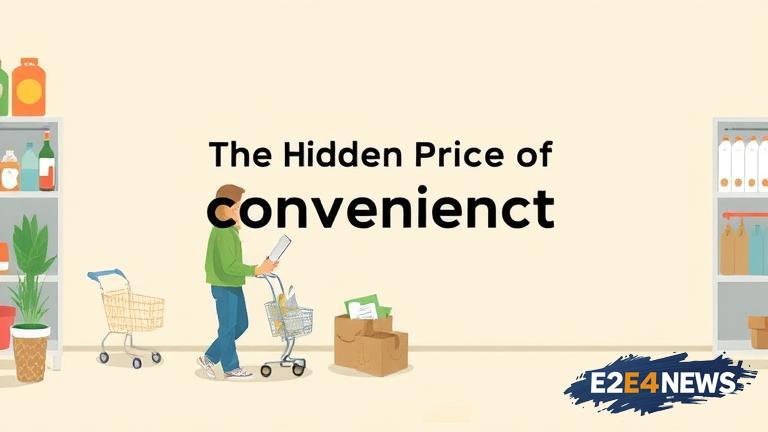In today’s fast-paced world, convenience is often the top priority. We crave instant gratification, whether it’s same-day delivery, drive-thru meals, or single-use plastics. However, this convenience comes with a hidden cost. The production, packaging, and disposal of these convenient products contribute to environmental degradation, pollution, and waste management issues. Furthermore, the rise of e-commerce and online shopping has led to an increase in carbon emissions, as more vehicles are on the road delivering packages. The consequences of our actions are far-reaching, from climate change to social isolation. As we rely more heavily on technology and digital platforms, face-to-face interactions and community engagement suffer. The cost of convenience also extends to our physical and mental health, as a sedentary lifestyle and poor diet become more prevalent. Moreover, the exploitation of workers in the gig economy and the lack of job security are additional concerns. The impact on local businesses and communities should not be overlooked, as the shift to online shopping and convenience stores leads to the decline of small, independent retailers. To mitigate these effects, individuals can make conscious choices, such as opting for sustainable products, reducing energy consumption, and supporting local businesses. Governments and corporations also have a role to play in promoting environmentally friendly practices and ensuring fair labor standards. By acknowledging the true cost of convenience, we can work towards creating a more sustainable and equitable future. The first step is to recognize the value of our daily choices and the impact they have on the world around us. As consumers, we have the power to demand change and promote positive practices. The cost of convenience is not just a financial burden, but a social and environmental one as well. It is essential to consider the long-term effects of our actions and strive for a balance between convenience and sustainability. Ultimately, the key to a more sustainable future lies in our ability to make informed choices and prioritize the well-being of both people and the planet. By doing so, we can create a better world for generations to come. The importance of community engagement and social connections should not be underestimated, as they are essential for our emotional and mental well-being. In conclusion, the cost of convenience is a complex issue that requires a multifaceted approach. By understanding the true cost of our daily habits, we can work towards creating a more sustainable, equitable, and connected world. The time to act is now, and the power to make a difference lies in our hands. We must take responsibility for our actions and strive for a better future. The cost of convenience is a reminder that our choices have consequences, and it is up to us to make a positive impact. As we move forward, it is essential to prioritize sustainability, fairness, and community engagement. Only then can we create a world that is truly convenient for all.
